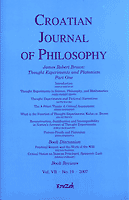An Embodied Cognition View of Imagery-Based Reasoning in Science: Lessons from Thought Experiments
An Embodied Cognition View of Imagery-Based Reasoning in Science: Lessons from Thought Experiments
Author(s): Andreas K. A. GeorgiouSubject(s): Philosophy
Published by: KruZak
Keywords: Thought experiment; embodied cognition; mental imagery; imagistic reasoning; phenomenological primitives
Summary/Abstract: I consider how we might begin to redress a cognitive model for thought experimental and other imagery-based scientific reasoning from an embodied cognition viewpoint. The paper gravitates on clarifying four issues: (i) the danger of understanding the genuine novelty of thought-experimental reasoning and other imagery-based reasoning as a product of ‘quasi-perceiving’ new phenomenology with the ‘mind’s eye’ (as asserted by quasi-pictorialist theories of imagery); (ii) the erroneous choice of units of analysis that assume equivalence of external reports of visual imagery with those internal structures that govern imagery-based reasoning, which are, as I will argue, largely linked to motor processes; (iii) the establishment of thought experimentation as imagery-based reasoning by providing evidence for the psychological necessity of imagistic simulation in thought experiments; (iv) a cognitive model for how learning via thought experimentation and other imagery-based reasoning takes place. The study was underpinned by constructivist assumptions. Case methodology was adopted, the case being a pair of final year A-level physics students. Data was collected through non-participant observation over two sessions of collaborative problem-solving. The tasks drew upon Newtonian mechanics.
Journal: Croatian Journal of Philosophy
- Issue Year: VII/2007
- Issue No: 20
- Page Range: 215-248
- Page Count: 34
- Language: English
- Content File-PDF

